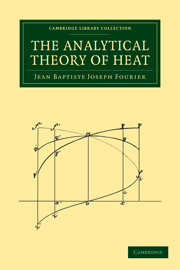Book contents
- Frontmatter
- PREFACE
- Contents
- PRELIMINARY DISCOURSE
- CHAPTER I Introduction
- CHAPTER II Equation of the Movement of Heat
- CHAPTER III Propagation of Heat in an infinite rectangular solid
- CHAPTER IV Of the linear and varied Movement of Heat in a ring
- CHAPTER V Of the Propagation of Heat in a solid sphere
- CHAPTER VI Of the Movement of Heat in a solid cylinder
- CHAPTER VII Propagation of Heat in a rectangular prism
- CHAPTER VIII Of the Movement of Heat in a solid cube
- CHAPTER IX Of the Diffusion of Heat
PRELIMINARY DISCOURSE
Published online by Cambridge University Press: 29 August 2010
- Frontmatter
- PREFACE
- Contents
- PRELIMINARY DISCOURSE
- CHAPTER I Introduction
- CHAPTER II Equation of the Movement of Heat
- CHAPTER III Propagation of Heat in an infinite rectangular solid
- CHAPTER IV Of the linear and varied Movement of Heat in a ring
- CHAPTER V Of the Propagation of Heat in a solid sphere
- CHAPTER VI Of the Movement of Heat in a solid cylinder
- CHAPTER VII Propagation of Heat in a rectangular prism
- CHAPTER VIII Of the Movement of Heat in a solid cube
- CHAPTER IX Of the Diffusion of Heat
Summary
Primary causes are unknown to us; but are subject to simple and constant laws, which may be discovered by observation, the study of them being the object of natural philosophy.
Heat, like gravity, penetrates every substance of the universe, its rays occupy all parts of space. The object of our work is to set forth the mathematical laws which this element obeys. The theory of heat will hereafter form one of the most important branches of general physics.
The knowledge of rational mechanics, which the most ancient nations had been able to acquire, has not come down to us, and the history of this science, if we except the first theorems in harmony, is not traced up beyond the discoveries of Archimedes. This great geometer explained the mathematical principles of the equilibrium of solids and fluids. About eighteen centuries elapsed before Galileo, the originator of dynamical theories, discovered the laws of motion of heavy bodies. Within this new science Newton comprised the whole system of the universe. The successors of these philosophers have extended these theories, and given them an admirable perfection: they have taught us that the most diverse phenomena are subject to a small number of fundamental laws which are reproduced in all the acts of nature.
- Type
- Chapter
- Information
- The Analytical Theory of Heat , pp. 1 - 13Publisher: Cambridge University PressPrint publication year: 2009First published in: 1878



